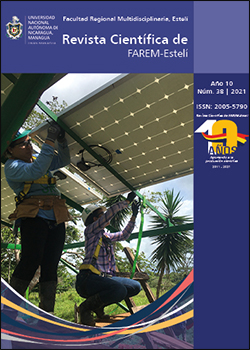Opportunities of Project Based Learning (PBL) for professional pedagogy at the University of Holguin, Cuba
DOI:
https://doi.org/10.5377/farem.v0i38.11943Keywords:
Opportunities, Project Based Learning (PBL), professional pedagogyAbstract
The visible opportunities that project-based learning offers to any level of education in general is evidenced in the experiences shown in the present research from any level of education. As the student advances in more important grades, the interaction between his learning through the elaboration of a project contributes to an ethical and aesthetic behavior that should characterize any worker on the basis of the meanings, senses and professional experiences that the student acquires individually during teaching, labor insertion, and research. The Project Based Learning method, recognized as PBL, is a strength that can be used by professional pedagogy because it is socialized with the working world and constitutes a vocational orientation for students. This article is the result of a documentary research on the PBL method.
Downloads
References
Acosta C., (2017, 15 de marzo). Diario de un viajero. https://www.educaciontrespuntocero.com/experiencias/diario-viaje-proyecto-primaria-basado-metodo-abp/124.
Alonso B., Leyva F., y Mendoza T., (junio 7, 2018). El aprendizaje mediante el desarrollo de proyectos formativos. Curso pre evento Pedagogía. Holguín, Cuba
Apel H., y Knoll M., (in press). Projekt lernen. Grundlegungen und anleitungen. Munchen: Oldenbourg Verlag, Alemania.
Bednarz S., et. al., (Eds) (2013). A road map for 21st century geography education: Geography education research. Washington, DC: Association of American Geographers.
Bruner J. (1977). El proceso de educación. Editorial Harvard University Press.
Bruner J. y Goodman C., (1947). Value and need as organizing factors in perception. Journal of Abnormal and Social Psychology, 42, 33-44
Ciro A., (2012). Aprendizaje Basado en Proyectos (A.B.Pr). Como estrategia de enseñanza y Aprendizaje en la Educación Básica y Media. (Tesis de maestría). Universidad Nacional de Colombia. Medellín, Colombia.
Concepción R. y Rodríguez F., (2006). Rol del profesor y sus estudiantes en el proceso de enseñanza –aprendizaje. Holguín: Ediciones Holguín
Cortijo, R. (1996). Didáctica de las ramas técnicas: una alternativa para su desarrollo. Editorial: La Habana. Cuba.
De Miguel, R. (2014). Innovative Learning Approaches to Secondary School Geography in Europe: New Challenges in the Curriculum. En De Miguel R. y Donert, K. (eds.), Innovative Learning Geography. New challenges for the 21st Century, Newcastle-upon-Tyne: Cambridge Scholars Publishing, 21-38.
García et al., (2010). Learn from practice: defining an alternative model for software engineering education in Mexican universities for reducing the breach between industry and academia. Proc. of the 2010 International Conference on Applied Computer Science. WSEAS Press. pp. 120-124.
Kerski J., (2011). Sleepwalking into the Future – The Case for Spatial Analysis Throughout Education. En Jekel, T,
Koller, A., Donert, K. y Vogler, R. (eds.) Learning with GI. Berlín: Wichmann Verlag. Alemania.
Knoll M., (1997). The Project Method: its Vocational Education Origin and International Development. JITE. Volume 34, Number 3. Spring 1997.
Kolvoord R., (2012).Integrating Geospatial Technologies and Secondary Student Projects: The Geospatial Semester. Didáctica Geográfica 13, 57-67.
León D., Martínez M. y Santos P. (2018). Análisis de la investigación sobre Aprendizaje basado en Proyectos en Educación Física. Revista Electrónica Interuniversitaria de Formación del Profesorado (REIFOP). Número 60 (21,2)–abril 2018
Moursund D., (2001, 4 de septiembre). Aprendizaje por proyectos con las TIC. http://www.eduteka.org/tema_mes.php3?TemaID=0007
Mújica R., (2011) Aprendizaje por proyectos una vía al fortalecimiento de los semilleros de investigación. Editorial CEDEDUIS.
Peirats, J. y Granados, J. (2015). Las unidades pedagógicas hospitalarias y el aprendizaje por proyectos de trabajo. Aula de Encuentro, nº 17, volumen 1. Páginas 187-211
Pinos Medrano, H. A. (2015). Uso del método de aprendizaje basado en proyectos (ABP), para la carrera de Arquitectura. Revista Universidad y Sociedad 7 (3). pp. 112-116.
Pujol C., (2017). Aprendizaje Basado en Proyectos y por descubrimiento como estrategia didáctica de biología y geología de 4 ESO. (Tesis de maestría). Universidad Internacional de La Rioja. España.
Rodríguez Z., (2017, 3 de mayo). Tres ejemplos de Aprendizaje Basado en Proyectos (ABP).https://esoesciencia.wordpress.com/2017/03/09/3-ejemplos-de-aprendizaje-basado-en-proyectos-abp/
Téllez, L. (2005). Modelo didáctico del proyecto como forma de organización de la práctica preprofesional del técnico medio en electricidad. (Tesis doctoral). Instituto Superior Pedagógico José de la Luz y Caballero, Holguín
Trujillo S., (2013, 9 de septiembre). Curso aprendizaje basado en proyectos https://www.bbccom.cdn.ampproy.org
Zúñiga I., (2017, 7 de septiembre). Proyecto Integrador uno. Carrera de ingeniería civil. Universidad de Holguín. moodle.uho.edu.cu/course/index.php?categoryid=1303
Published
Issue
Section
License
Copyright (c) 2021 Revista Científica de FAREM-Esteli

This work is licensed under a Creative Commons Attribution-NonCommercial-ShareAlike 4.0 International License.



